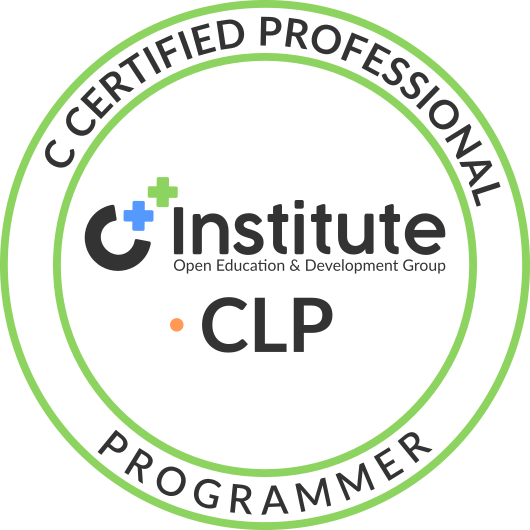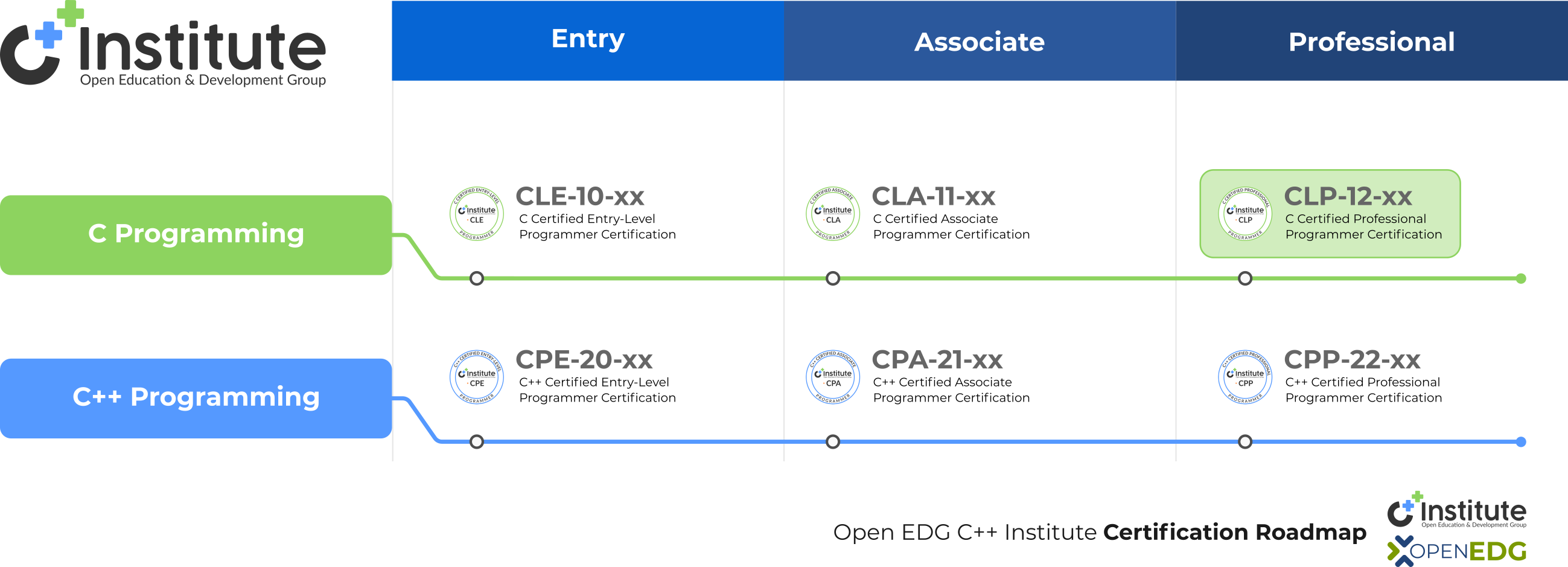The CLP – C Certified Professional Programmer certification validates advanced-level C programming skills required to build efficient, portable, and reliable software. It confirms your readiness to handle modern C features, low-level programming techniques, and system-level operations in real-world environments.
The certification is ideal for C programmers who have already earned the CLA certification and are ready to take their skills to the next level by working with more complex applications and performing systems-level programming tasks across diverse computing platforms.

To earn the CLP credential, candidates should demonstrate advanced knowledge and practical expertise in:

Exam name:
CLP – C Certified Professional Programmer
Exam code:
CLP-12-0x (x denotes the exam version)
Associated certifications:
CLE – C Certified Entry-Level Programmer
CLA – C Certified Associate Programmer
Prerequisites:
No formal prerequisites.
CLA certification or equivalent experience is recommended.
Exam version:
CLP-12-01 (Active)
Duration:
65 minutes (exam) + approx. 10 minutes (Non-Disclosure Agreement/Tutorial)
Number of questions:
55
Format:
Single-select & multiple-select questions
Passing score:
70%
Cost:
From USD 325 (Exam)
From USD 375 (Exam + Retake)
Languages:
English
Learning resources:
C Advanced – Cisco Networking Academy (Go to Cisco NetAcad)
C Advanced (CA) – OpenEDG Learning Platform (Go to Edube)
Exam delivery channel:
Exam policies:
Click here to go to Exam Policies
Exam syllabus:
Click here to go to Exam Syllabus
Exam Vouchers
Exam vouchers available through the OpenEDG Voucher Store
The CLP – C Certified Professional Programmer certification measures a candidate’s ability to solve complex programming problems using advanced features of the C language. It assesses practical proficiency in modern constructs, memory and parameter management, low-level I/O, threading, numeric precision, and more.
The exam consists of 55 questions covering a wide range of advanced topics. Candidates must demonstrate a deep understanding of C’s evolution, mastery of the standard library, familiarity with POSIX and system-level operations, and the ability to write clean, robust, and efficient C code in complex scenarios. The maximum score is 1000 points, normalized to percentages, with a passing threshold set at 70%. Each question is weighted differently and the exam has been psychometrically developed to ensure fairness, validity, and reliability.
Block 1 – Applied Evolution of C Programming
(Exam items: 8 | Weight: 14.5%)
Block 2 – Variadic Functions and Macros
(Exam items: 5 | Weight: 9%)
Block 3 – Fundamentals of Low-Level IO
(Exam items: 7 | Weight: 13%)
Block 4 – Memory and String Handling
(Exam items: 9 | Weight: 16%)
Block 5 – Process and Thread Management
(Exam items: 5 | Weight: 9%)
Block 6 – Numerical Types and Computations
(Exam items: 6 | Weight: 11%)
Block 7 – Network Socket Programming
(Exam items: 7 | Weight: 13%)
Block 8 – Specialized Programming Considerations
(Exam items: 8 | Weight: 14.5%)
A Minimally Qualified Candidate (MQC) for the CLP – C Certified Professional Programmer exam is a programmer with solid experience in the C language who has progressed beyond foundational and associate-level knowledge. The MQC is capable of applying advanced C features in system-level development, performance-critical applications, or environments requiring detailed memory and resource management. They demonstrate strong reasoning skills, understand the implications of low-level constructs, and can work confidently with external libraries and system APIs.
The MQC understands the evolution of the C standard, manages variable-length arguments and data structures, and performs system-level file I/O operations using POSIX or equivalent interfaces. They can manipulate memory blocks, perform complex string and numerical computations, and use standard algorithms effectively. The MQC can design multi-threaded programs, analyze platform-specific behaviors, manage undefined behavior scenarios, and write portable, maintainable, and efficient C code in real-world environments.
Last updated: July 24, 2025
First published: December 9, 2017
Aligned with Exam CLP-12-01